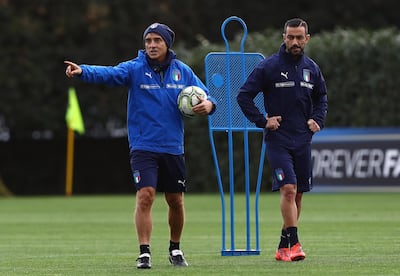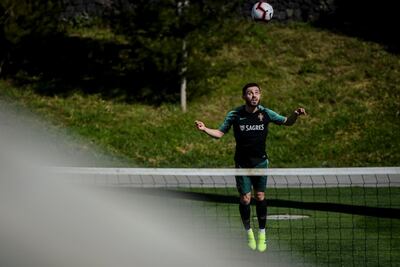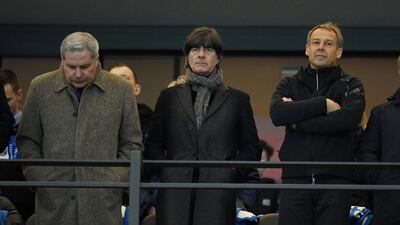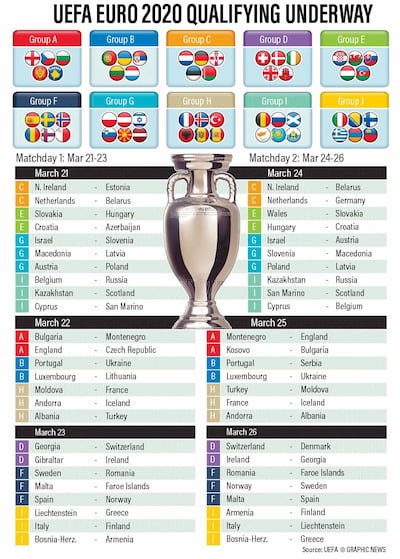Germany’s root canal surgery
And then there were two.
So radical has been Germany’s reappraisal of who is best suited to carry the national team from their sudden, brutal slump since they held the title of world champions that only two of the players who defeated Argentina in the World Cup final in 2014 are included in the squad for the first round of qualifying for Euro 2020.
And even that pair, captain Manuel Neuer and midfielder Toni Kroos, find themselves under harsh scrutiny.
The other notable survivor, of course, is Joachim Low, the manager since 2006 and a man apparently equipped with a suit of armour-plating as well as the stylish V-neck jumpers he wears on the touchline. Low was not dismissed by a supportive German Federation after the first-round exit at the Russia World Cup last summer, and he has since survived Germany's relegation from the top tier of the Uefa Nations League.
He now has a radical manifesto, as he outlined to widespread surprise when he announced that a senior trio of allies, Mats Hummels, Thomas Muller and Jerome Boateng, all of Bayern Munich, would not not be called up for this week’s friendly with Serbia and Sunday’s qualifier in the Netherlands.
Furthermore, he said he would not be summoning them at all on his watch.
Progress is thus in the hands of the likes of Joshua Kimmich, the versatile Bayern full-back and midfielder, Leon Goretzka, picked less often than Muller in Bayern’s first team this season, and Niklas Sule, the giant central defender who jousts with Hummels and Boateng for a spot in his club XI.
And of course Neuer, who has Marc-Andre ter Stegen of Barcelona breathing down his neck for the gloves, and Kroos, whose form has dipped lately at Real Madrid.
Low talks of a “new chapter”, but unfortunately he was unable to open its first page in person. He missed Monday’s training session with his fresh-faced squad in order to undergo surgery on a dental problem. He hopes that, by Sunday, and a rigorous examination in Amsterdam, his youngsters have found their bite.

Quagliarella adds quantity to quality
Fabio Quagliarella will turn 37 six months before the next European championship finals. Yet he has never been more prolific as a goalscorer, having just passed 20 in a Serie A season for the first time in this, his 14th top-flight campaign.
Hence the call-up for the much-travelled Sampdoria entertainer to the Italy squad.
Roberto Mancini, the Italy manager embarking on his first major tournament campaign, explained: “I could not ignore him, whatever his age, and I think he can give us something.”
Quagliarella, formerly of Juventus, Napoli, Torino, Udinese and Ascoli, and better known for his spectacular goals rather than the quantity of them, was last capped by his country in November 2010, and trusts this long-awaited recall brings better luck.
His Italy career, which amounts to 25 caps and seven goals, took him to two tournaments, one of which ended with a penalty shoot-out quarter-final defeat against Spain (Euro 2008), and the other with a humiliating group stage exit (the 2010 World Cup).

The Great Play-Off Puzzle
Some ongoing, and fiendishly complicated calculations will inform most of the qualifiers over the next eight months.
That is because the Nations League, the competition Uefa introduced to run alongside the Euro 2020 qualifiers – and which has provided some stirring entertainment – has already granted some teams a guaranteed potential spot in the play-offs for the last four spots in the finals should they fail to finish in the top two of their group.
Will this prey on minds, act as a comforting insurance? Quite likely in many cases. In Euro 2020 qualifying Group B, for instance, three nations, Portugal, Ukraine and Serbia have a play-off parachute already banked in case of a slip-up.
Even countries who did not top their Nations League mini-groups can keep half an eye on the pre-set route to the play-offs, because now they can accurately see, from the Nations League standings from last November, where they rank in the queue if and when a play-off-enabled team qualifies automatically.
One example: Wales would make the play-offs if any three of Bosnia, Denmark, Sweden, Ukraine, Russia or Austria qualify automatically, and Wales fail to finish first or second in their group.

Pole position
The most potent attacking line-up in action in Europe this week? On form, it must be Poland’s.
Three Poles are in the top 10 of the European strikers in the Golden Shoe rankings for the season. Bayern Munich’s Robert Lewandowski, AC Milan’s Krzysztof Piatek and Napoli’s Arkadiusz Milik have 52 league goals between them.



